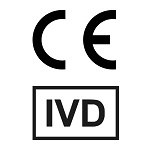HPV E6/E7 mRNA Test for Cervical Cancer
Detects the presence of HPV E6/E7 mRNA for early detection of cervical cancer.
CE/IVD Marked Product
Research Product
Research Service
Early Detection/Screening
Diagnosis
Therapy Selection
Therapy Monitoring
HPV Test
Almost all cervical cancer cases are caused by persistent HPV infection. HPV testing provides better sensitivity than cytology alone and allows earlier detection of cervical cancer. New American Cancer Society guideline (2020) recommends HPV testing every five years as a preferred screening method for cervical cancer.
The HPV mRNA assays provide higher specificity than HPV DNA-based assays. The improved specificity helps reduce the number of people sent to colposcopy and prevent over treatment.
Efficient Workflow: direct approach without DNA/RNA purification, RT-PCR, or target RNA amplification
Accepted sample type: cervical samples (PreservCyt® and SurePath® preservation fluid) and FFPE
The test differentiates between persistent and transient HPV infection
The DiaCarta Offerings
PRODUCT
QuantiVirus™ HPV mRNA Test is a CE/IVD marked product for countries with CE/IVD compliance. It could also be used as a research product in the United States.
- Pack size: 96 reactions per kit
- Catalog #: DC-01-0001 (CE/IVD version)
- Catalog #: DC-01-0001R (Research Use Only version)
SERVICE
QuantiVirus™ HPV E6/E7 mRNA Test is available at DiaCarta as a research service.
Why do we test HPV mRNA?
FDA approves both HPV DNA and mRNA testing methods for HPV testing.
HPV DNA Test
HPV DNA testing detects DNA present in transient infection (HPV cleared within a couple of years) and persistent infection.
Suboptimal specificity
Although HPV DNA testing is widely used for HPV testing, it suffers from suboptimal specificity, leading to many unnecessary colposcopy and follow-up procedures.
False-negative detection
In more severe cervical intraepithelial lesion (CIN) cases, HPV DNA is decreased while HPV mRNA is increased. This leads to false-negative detection using the HPV DNA test.
HPV mRNA Test
HPV mRNA test detects mRNA in infected cells, where E6/E7 mRNA is produced and eventually changes the normal cells to cancer cells.
Higher specificity
The HPV mRNA assays provide higher specificity than HPV DNA-based assays. The improved specificity helps reduce the number of people sent to colposcopy and prevent over treatment.





